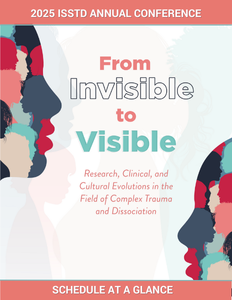Back
90 Minute Workshop
Trauma Treatment in the Context of Psychosis
Sunday, March 16, 2025
1:30 PM – 3:00 PM US Eastern Time
Location: Clarendon
Learning Level: Intermediate
- RT
Radoslaw Tomalski, MD, PhD (he/him/his)
Team member
Reasearch Centre for Trauma & Dissociation
Katowice, Slaskie, Poland
Abstract
The relationship between trauma and psychosis is complex and increasingly recognized as significant in both research and clinical settings. Recognizing the effects of trauma leads to more holistic and humanistic treatment plans for people with psychosis, contrasting with the biologically-oriented paradigm that prevails in mainstream psychiatry. This presentation will explore the high prevalence of trauma among individuals with psychosis, including specific forms of traumatic events related to psychosis itself and its treatment. The challenges involved in assessing trauma in people with psychosis will also be discussed.
The presentation will address how trauma can contribute to the development of psychosis. Studies suggest that trauma, on various levels—both biological and psychological—can lead to psychotic symptoms. By understanding these underlying mechanisms, clinicians can better recognize trauma as a potential driver of psychosis and tailor their treatment approaches accordingly.
Research shows that individuals with psychosis frequently meet the criteria for posttraumatic stress disorder (PTSD), which is dramatically underrecognized in this population. Emerging data also indicate a high prevalence of complex PTSD. The difficulties in assessing PTSD in the context of psychosis will be discussed, as PTSD and dissociation screening tools may not fully capture the extent of trauma-related symptoms in psychotic patients due to the cognitive and perceptual distortions that often accompany psychosis. Clinical vignettes will be provided to illustrate these challenges.
Although the role of dissociation lacks conceptual clarity, applying a dissociative lens may be helpful in understanding psychotic phenomena such as voices or delusions. This approach can guide treatment by helping clinicians develop more targeted interventions that address the underlying trauma rather than merely managing the surface symptoms of psychosis through medication.
Traditional psychosis treatments, primarily focused on pharmacotherapy, often fail to address the trauma that may be driving psychotic symptoms. By incorporating trauma-informed approaches, clinicians can improve treatment outcomes. The presentation will include vignettes of patients with auditory hallucinations, illustrating how trauma-informed conceptualization can lead to better treatment strategies. Additionally, the potential of EMDR in treating trauma within this population will be explored.
Finally, clinical data will be presented to support the safety and effectiveness of trauma-focused therapies in treating trauma-related symptoms in psychosis. There are now a number of ongoing studies on trauma treatment in the context of psychosis that demonstrate positive outcomes, reinforcing the need for further research and clinical application of these methods.
In conclusion, this presentation will provide clinicians with practical insights into integrating trauma treatment into psychosis care, offering strategies to improve patient outcomes by addressing the often-overlooked trauma-psychosis connection.
The relationship between trauma and psychosis is complex and increasingly recognized as significant in both research and clinical settings. Recognizing the effects of trauma leads to more holistic and humanistic treatment plans for people with psychosis, contrasting with the biologically-oriented paradigm that prevails in mainstream psychiatry. This presentation will explore the high prevalence of trauma among individuals with psychosis, including specific forms of traumatic events related to psychosis itself and its treatment. The challenges involved in assessing trauma in people with psychosis will also be discussed.
The presentation will address how trauma can contribute to the development of psychosis. Studies suggest that trauma, on various levels—both biological and psychological—can lead to psychotic symptoms. By understanding these underlying mechanisms, clinicians can better recognize trauma as a potential driver of psychosis and tailor their treatment approaches accordingly.
Research shows that individuals with psychosis frequently meet the criteria for posttraumatic stress disorder (PTSD), which is dramatically underrecognized in this population. Emerging data also indicate a high prevalence of complex PTSD. The difficulties in assessing PTSD in the context of psychosis will be discussed, as PTSD and dissociation screening tools may not fully capture the extent of trauma-related symptoms in psychotic patients due to the cognitive and perceptual distortions that often accompany psychosis. Clinical vignettes will be provided to illustrate these challenges.
Although the role of dissociation lacks conceptual clarity, applying a dissociative lens may be helpful in understanding psychotic phenomena such as voices or delusions. This approach can guide treatment by helping clinicians develop more targeted interventions that address the underlying trauma rather than merely managing the surface symptoms of psychosis through medication.
Traditional psychosis treatments, primarily focused on pharmacotherapy, often fail to address the trauma that may be driving psychotic symptoms. By incorporating trauma-informed approaches, clinicians can improve treatment outcomes. The presentation will include vignettes of patients with auditory hallucinations, illustrating how trauma-informed conceptualization can lead to better treatment strategies. Additionally, the potential of EMDR in treating trauma within this population will be explored.
Finally, clinical data will be presented to support the safety and effectiveness of trauma-focused therapies in treating trauma-related symptoms in psychosis. There are now a number of ongoing studies on trauma treatment in the context of psychosis that demonstrate positive outcomes, reinforcing the need for further research and clinical application of these methods.
In conclusion, this presentation will provide clinicians with practical insights into integrating trauma treatment into psychosis care, offering strategies to improve patient outcomes by addressing the often-overlooked trauma-psychosis connection.
Learning Objectives:
At the conclusion of this session participants will be able to:
- Identify the prevalence and specific types of trauma commonly experienced by individuals with psychosis
- Describe the challenges in assessing PTSD and dissociative symptoms in psychotic patients
- Explain the role of trauma in the development of psychosis by analyzing psychological pathways
- Explain application of trauma-focused therapeutic approaches, such as EMDR, to treat trauma-related symptoms in psychotic patients
- Evaluate clinical data on the effectiveness of trauma-focused therapies in improving outcomes for patients with psychosis

